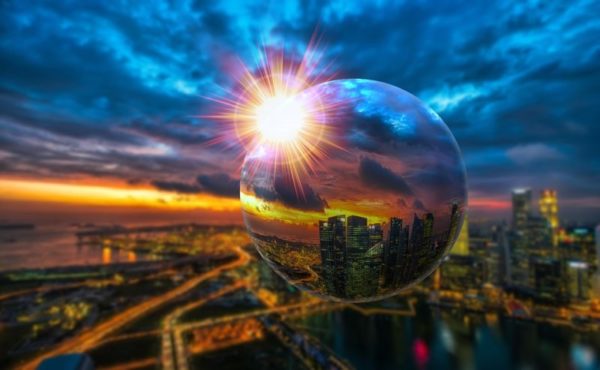
I just finished a new short story called “High Seven,” which takes place 150 years from now in a future where the world has devolved into a series of city-states that are holding on as best they can against the ravages of climate change.
My view of the future has dimmed markedly over the last twenty years, and even more so over the last four. It’s hard now to see a future that’s not defined by climate change, one way or another. I still have hope, and my stories reflect that, but it’s a hope that somehow we’ll manage to survive everything that’s coming.
We live in a time when the sins of the past – superstition, racism, homophobia, Luddism and paranoia – seem to be coming back to haunt us when we most need to be pulling together to fight pandemics and fires and hurricanes and rising carbon levels across the world.
Of course those things never really left. At best, they were forced underground for a while, periodically erupting in our lives but at least kept under some semblance of general disapproval and societal control. But now some have opened the door once again, giving their followers license to embrace them openly.
Future forecasting is a tricky business in “normal” times. How many writers in the fifties foresaw the personal computer? How many seventies writers saw the coming of email and the world-wide web? And how many nineties writers missed the amazing and terrible influence social media would have on our world?
But 2020 and its brethren are far from what we used to call “normal.” What’s coming next to disrupt the world? Deepfakes – created photos and videos so real they fool our eyes and ears? The rise of artificial intelligence? Robotics?
The only thing that’s certain is that the world of the 2040’s will be far different than we think it will be.
It has become almost impossible to see a “normal” future, something we humans rely on to be able to plan our lives. As this pandemic has stretched on, so many things have been put on hold that even guessing at what 2021 will be like has become an exercise in futility.
It affects us sci-fi writers too. As prognosticators, we face three distinct, difficult tasks right now:
- finding our way through the mishegas of our own present circumstances to write about a plausible future
- deciding how much of the present should factor into it
- lancing through the despair to shine a light of hope and possibility in what we write
Nevertheless, we are tasked with being vision bringers. It’s a part of the job – to help the world imagine what might be.
Science fiction writers were among the first to imagine plunging into the depths of the sea and piercing the sky to fly to the Moon and Mars. Some astute sci-fi writers did, in fact, predict many of the elements of today’s society and the progress of the last 100 years (my rant above notwithstanding). And we speculators are uniquely qualified to shine a light on what tomorrow could be.
So I take up my pen (or my laptop) and I clear my head, casting my mind into the future, scribbling my thoughts down on virtual paper to share with the world.
Will I screw it up? Probably. As I mentioned, predicting the future is an extremely tricky business.
But there’s one part all of us sci-fi folks have to get right, because it’s what the world needs most right now:
Hope.
To my writer friends: are you finding a way to write hopeful futures? What’s clouding your own crystal ball?
